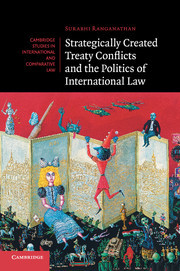Description
Strategically Created Treaty Conflicts and the Politics of International Law
Cambridge Studies in International and Comparative Law Series
A richly textured account of the making, implementing, and changing of international legal regimes, which encompasses law, politics and economics.
Language: English
Strategically Created Treaty Conflicts and the Politics of International Law
Publication date: 11-2016
Support: Print on demand
Publication date: 11-2016
Support: Print on demand
Strategically Created Treaty Conflicts and the Politics of International Law
Publication date: 12-2014
484 p. · 16x24 cm · Hardback
Publication date: 12-2014
484 p. · 16x24 cm · Hardback
Description
/li>Contents
/li>Biography
/li>
Treaty conflicts are not merely the contingent or inadvertent by-products of the increasing juridification of international relations. In several instances, states have deliberately created treaty conflicts in order to catalyse changes in multilateral regimes. Surabhi Ranganathan uses such conflicts as context to explore the role of international law, in legal thought and practice. Her examinations of the International Law Commission's work on treaties and of various scholars' proposals on institutional action, offer a fresh view of 'mainstream' legal thought. They locate, in a variety of writings, a common faith in international legal discourse, built on liberal and constructivist assumptions. Ranganathan's three rich studies of treaty conflict, relating to the areas of seabed mining, the International Criminal Court, and nuclear governance, furnish a textured account of the specific forms and practices that constitute such a legal discourse and permit a grounded understanding of the interactions that shape international law.
Foreword James Crawford; Part I. Introduction: 1. Strategically created treaty conflicts; Part II. International Law Thought: 2. Writing the 'principle of political decision' into the law of treaties; 3. The idea of effective implementation of treaties; Part III. Treaty Conflicts in Practice: 4. Notions of ocean: the dispute over deep seabed mining; 5. Courting the United States? The International Criminal Court and Article 98 Agreements; 6. Fissions in the nuclear order: the India-US nuclear deal and the nuclear governance regime; Part IV. Conclusion: 7. The politics of international law; Appendices.
Surabhi Ranganathan is a University Lecturer in International Law and Fellow of King's College, Cambridge.
© 2024 LAVOISIER S.A.S.




